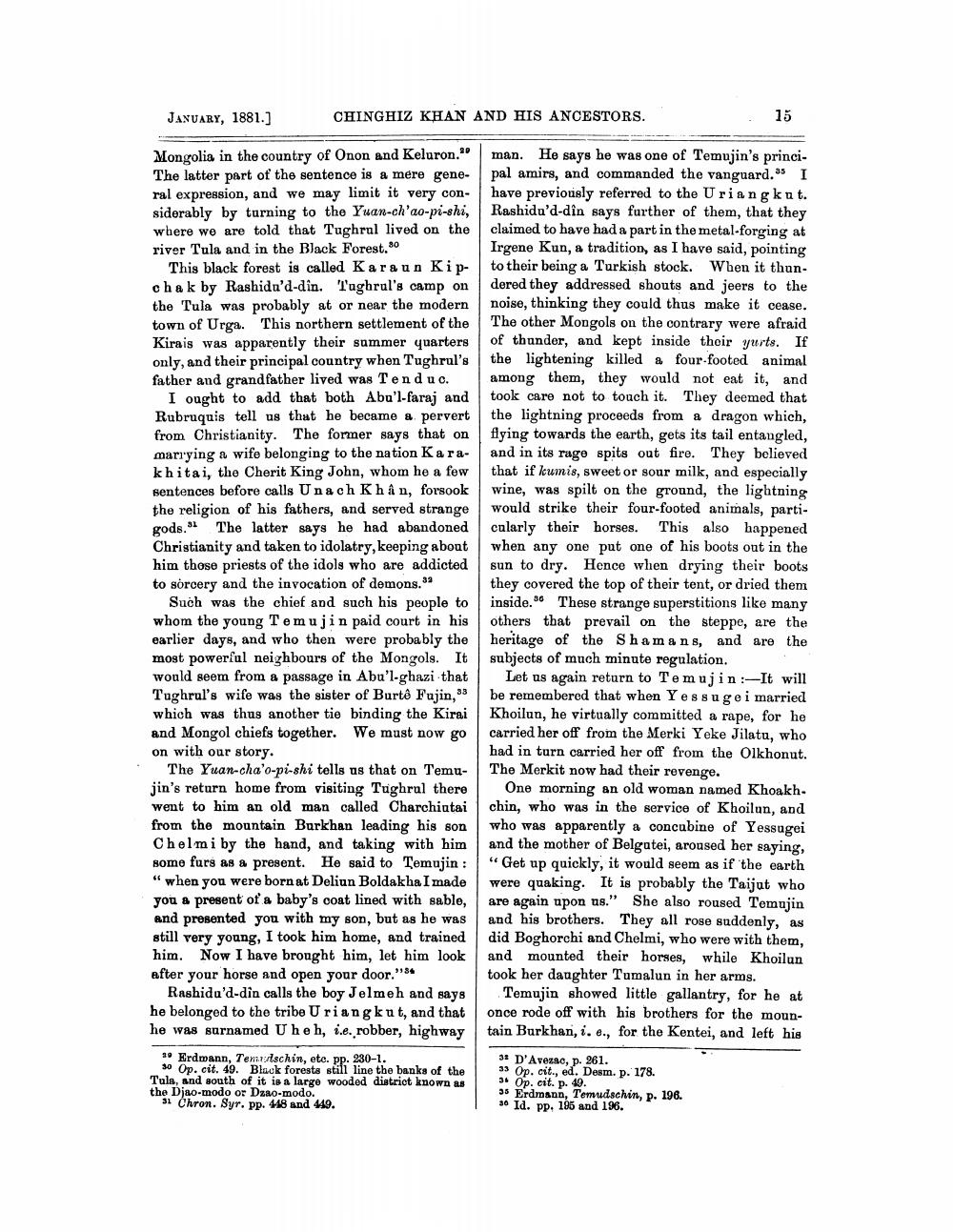________________
CHINGHIZ KHAN AND HIS ANCESTORS.
JANUARY, 1881.]
Mongolia in the country of Onon and Keluron."" The latter part of the sentence is a mere general expression, and we may limit it very considerably by turning to the Yuan-ch'ao-pi-shi, where we are told that Tughrul lived on the river Tula and in the Black Forest. 30
This black forest is called Kara un Kipchak by Rashida'd-din. Tughral's camp on the Tula was probably at or near the modern town of Urga. This northern settlement of the Kirais was apparently their summer quarters only, and their principal country when Tughrul's father and grandfather lived was Tenduc.
I ought to add that both Abu'l-faraj and Rubruquis tell us that he became a pervert from Christianity. The former says that on marrying a wife belonging to the nation Ka rakhitai, the Cherit King John, whom he a few sentences before calls Unach Khân, forsook the religion of his fathers, and served strange gods." The latter says he had abandoned Christianity and taken to idolatry, keeping about him those priests of the idols who are addicted to sorcery and the invocation of demons. 33
Such was the chief and such his people to whom the young Temujin paid court in his earlier days, and who then were probably the most powerful neighbours of the Mongols. It would seem from a passage in Abu'l-ghazi that Tughrul's wife was the sister of Burtê Fujin, 33 which was thus another tie binding the Kirai and Mongol chiefs together. We must now go on with our story.
The Yuan-cha'o-pi-shi tells us that on Temujin's return home from visiting Tughrul there went to him an old man called Charchiutai from the mountain Burkhan leading his son Chelmi by the hand, and taking with him some furs as a present. He said to Temujin: "when you were born at Deliun Boldakha I made you a present of a baby's coat lined with sable, and presented you with my son, but as he was still very young, I took him home, and trained him. Now I have brought him, let him look after your horse and open your door."
Rashidu'd-din calls the boy Jelmeh and says he belonged to the tribe Uriangkut, and that he was surnamed U heh, i.e. robber, highway
29 Erdmann, Temulschin, etc. pp. 230-1.
30 Op. cit. 49. Black forests still line the banks of the Tula, and south of it is a large wooded district known as the Djao-modo or Dzao-modo.
31 Chron. Syr. pp. 448 and 449.
15
man. He says he was one of Temujin's principal amirs, and commanded the vanguard." I have previously referred to the Uriangkut. Rashidu'd-din says further of them, that they claimed to have had a part in the metal-forging at Irgene Kun, a tradition, as I have said, pointing to their being a Turkish stock. When it thundered they addressed shouts and jeers to the noise, thinking they could thus make it cease. The other Mongols on the contrary were afraid of thunder, and kept inside their yurts. If the lightening killed a four-footed animal among them, they would not eat it, and took care not to touch it. They deemed that the lightning proceeds from a dragon which, flying towards the earth, gets its tail entangled, and in its rage spits out fire. They believed that if kumis, sweet or sour milk, and especially wine, was spilt on the ground, the lightning would strike their four-footed animals, particularly their horses. This also happened when any one put one of his boots out in the sun to dry. Hence when drying their boots they covered the top of their tent, or dried them inside. These strange superstitions like many others that prevail on the steppe, are the heritage of the Shamans, and are the subjects of much minute regulation.
Let us again return to Temujin:-It will be remembered that when Yes suge i married Khoilun, he virtually committed a rape, for he carried her off from the Merki Yeke Jilatu, who had in turn carried her off from the Olkhonut. The Merkit now had their revenge.
One morning an old woman named Khoakhchin, who was in the service of Khoilun, and who was apparently a concubine of Yessugei and the mother of Belgutei, aroused her saying, "Get up quickly, it would seem as if the earth were quaking. It is probably the Taijut who are again upon us." She also roused Temujin and his brothers. They all rose suddenly, as did Boghorchi and Chelmi, who were with them, and mounted their horses, while Khoilun took her daughter Tumalun in her arms.
Temujin showed little gallantry, for he at once rode off with his brothers for the mountain Burkhan, i. e., for the Kentei, and left his
32 D'Avezac, p. 261.
33 Op. cit., ed. Desm. p. 178.
3 Op. cit. p. 49.
35 Erdmann, Temudschin, p. 196.
30 Id. pp. 195 and 196.




